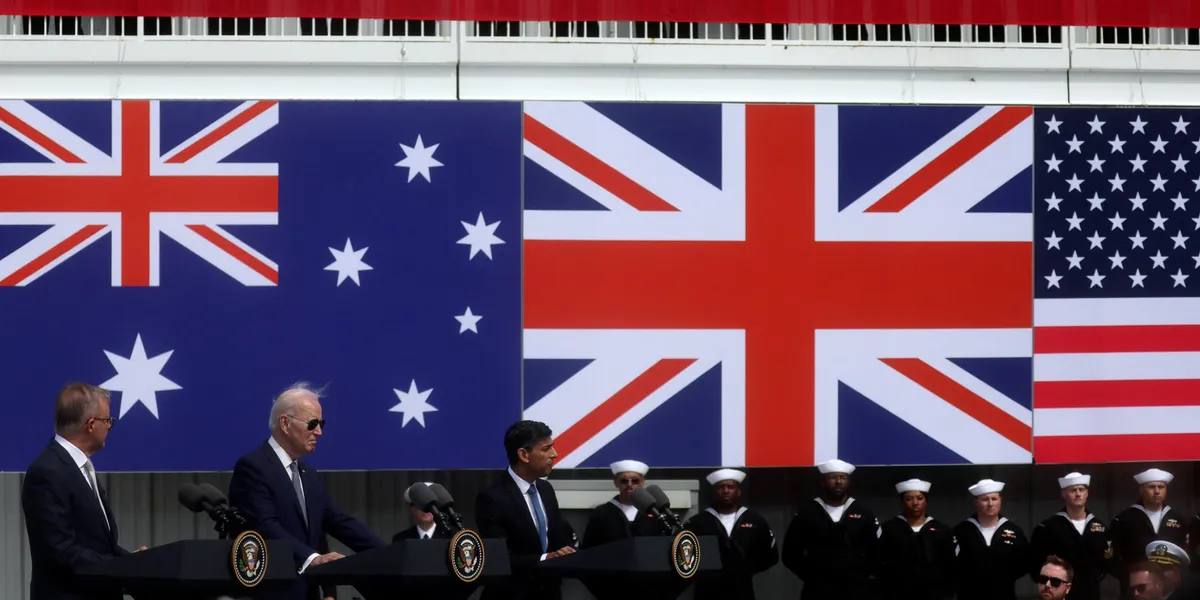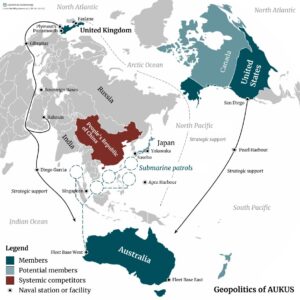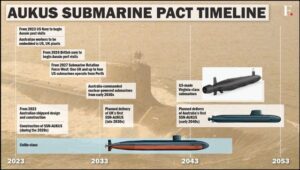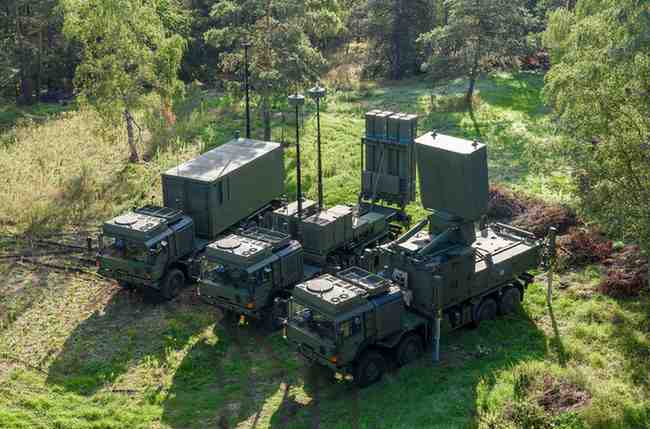Introduction
AUKUS is a trilateral security alliance that was officially established in September 2021 with the objective of acting as a strategic partner for Australia, the United Kingdom, and the United States as they work to improve their mutual deterrence and defense capabilities in the Indo-Pacific. The assistance provided by the US and UK to Australia in building a fleet of nuclear-powered submarines to strengthen its maritime defense capabilities is a key element of this cooperation.
On March 13, 2023, following an 18-month period of consultation, President of US Joe Biden, Prime Ministers of the United Kingdom Sunak, and Prime Minister of Australia Albanese jointly announced the most optimal way for Australia to acquire SSNs, conventionally armed nuclear-powered submarines, under the Australia-UK-United States (AUKUS) partnership.[1]
AUKUS focused mainly on two poles. The Pole I focus on the acquisition and development of nuclear-powered conventional submarines for the Royal Australian Navy, while Pole II calls for cooperation on cutting-edge capabilities that will involve technology and information sharing.[2]
Background
AUKUS can be traced back to the 2017 meeting between Australian Prime Minister Malcolm Turnbull and US President Donald Trump.[3] The two leaders decided to expand their defense capability collaboration during that summit.
According to the agreement, the United States will give Australia access to its nuclear submarine technology. This is an important milestone since Australia will deploy nuclear-powered submarines for the first time outside of the Five Eyes intelligence partnership. The partnership basically seeks to improve collaboration across a number of fields, including security, technology, and defense, with a focus on the Indo-Pacific area. As regional dynamics and security issues in the Asia-Pacific region change, AUKUS is considered as a response.
Addressing non-proliferation concerns within the context of AUKUS
The Australia, United Kingdom, and United States (AUKUS) cooperation offers a singular chance to address non-proliferation concerns through improved collaboration and strategic coordination. These countries can develop comprehensive strategies, diplomatic frameworks, and monitoring mechanisms that not only strengthen regional stability but also contribute to the larger global efforts to prevent the spread of nuclear weapons and cutting-edge military technologies by drawing on their technological know-how and shared commitment to international security.
AUKUS Partnership and its Significance
Enhancing the security and defense capacities of the member nations, particularly in the Indo-Pacific area, is one of the main objectives of the AUKUS Partnership. The AUKUS partnership represents a significant technological advancement for Australia’s naval capabilities with better endurance, range, and stealth.[4] The collaboration aims to strengthen regional stability and deterrence while also conveying an alert to potential enemies about the member nations’ dedication to preserving Indo-Pacific security. By forming AUKUS, member nations have furthered their political alignment by highlighting their shared interests and values. In order to sustain regional stability and promote a free and open Indo-Pacific, AUKUS works to uphold international principles. It also emphasizes how the dynamics of global partnerships and alliances are changing in response to shifting geopolitical concerns. AUKUS assists more secure and stable international environment by strengthening capabilities, fostering regional stability, and exhibiting a commitment to shared values. But it also creates challenging issues regarding technological transfer, anti-proliferation measures, and the dynamic character of global alliances.
Non-Proliferation Framework and Challenges
As part of the AUKUS alliance, Australia received sophisticated nuclear propulsion technology for nuclear-powered submarines, underscoring the significance of effective safeguards and verification procedures. It entails the sharing of cutting-edge defense technologies and raises concerns about the peaceful application of nuclear technology. The non-proliferation regime’s perceptions and diplomatic relations may be impacted by the AUKUS agreement. To guarantee that the cutting-edge technology exchanged under the partnership are used for peaceful purposes and do not unintentionally contribute to the proliferation of nuclear weapons, the AUKUS agreement needs to be align with the norms of the international non-proliferation framework.
The network of treaties, agreements, and standards that make up the international non-proliferation system work to stop the spread of nuclear weapons and related technologies. The Treaty on the Non-Proliferation of nuclear weapons (NPT) serves as the foundation of this system. Nuclear-weapon states (NWS) and non-nuclear-weapon states (NNWS) are the two categories into which nations fall under the NPT. While NNWS agree not to acquire nuclear weapons but are given access to peaceful nuclear technology, NWS agree to nuclear disarmament.[5]
Perhaps a deeper understanding of nuclear technology and its applications could result from the knowledge and experience obtained during the design and operation of nuclear-powered submarines. This might cause people to worry about this expertise being shared with other nations or organisations looking to build nuclear weapons. The difficulty lies in finding a balance between the risks of rising proliferation concerns and the justifiable advantages of knowledge sharing for peaceful purposes. To reduce these worries, effective export controls, information security, and openness will be necessary.[6]
Case Studies
- Iran Nuclear Deal (JCPOA)
The Joint Comprehensive Plan of Action (JCPOA) with Iran serves as an example of the difficulties involved in nuclear talks, technology transfers, and non-proliferation initiatives. [7] Discussions about AUKUS can benefit from learning from the JCPOA, which also emphasises the value of diplomacy, transparency, and safety measures.[8]
- North Korea’s Nuclear Program
The difficulties presented by North Korea’s nuclear programme highlight the importance of strong non-proliferation policies and local stability. The possible influence of the AUKUS alliance on regional dynamics calls for a thorough grasp of North Korea’s situation. [9]
- India’s Nuclear Pathway
India’s nuclear journey, which included its nuclear tests and follow-up negotiations, provides insights into the delicate balance between defense collaboration, technological advancement, and non-proliferation pledges.[10]
Recommendations and Policies
AUKUS member states should place a high priority on open communication when it comes to the transfer of nuclear technology, guaranteeing that it will only be used for civilian purposes and adhering to non-proliferation standards. They should enforce safeguards against nuclear technology diversion and reiterate their dedication to the NPT’s guiding principles.
To address issues, reduce misunderstandings, and advance regional stability, diplomatic efforts should be stepped up with participation from key regional stakeholders.
It is important to conduct an objective assessment of the AUKUS alliance’s possible effects on regional stability and non-proliferation efforts in order to inform policy decisions.
We actively collaborate with other NPT members to advance nuclear disarmament and peaceful nuclear energy use while upholding the NPT’s guiding principles. We attempt to lessen regional instability through multilateral discussions and weapons control negotiations. Beyond defense, we broaden our diplomatic outreach to promote amity and collaboration. A combined oversight committee controls technology transfers and incorporates protections as well. We carry out an independent assessment to determine the wider impact and modify policy as necessary. We prioritise these actions in an effort to improve non-proliferation, foster regional stability, and increase the good effects of the AUKUS alliance.
Conclusion
AUKUS alliance difficulties call for a diversified approach to strategy that handles issues with non-proliferation, regional stability, and diplomatic engagement. AUKUS members can develop a balanced and effective policy framework that fosters cooperation while preserving global security and stability by strengthening non-proliferation commitments, upholding NPT principles, fostering diplomacy, promoting regional stability, ensuring responsible technology transfer, and conducting thorough impact assessments.

Wajeeha Amin
Wajeeha Amin is student of defense and strategic studies at Qauid-i-Azam University, Pakistan. I have done my internships at foreign service academy, MOFA and ISSI.
- This author does not have any more posts.















